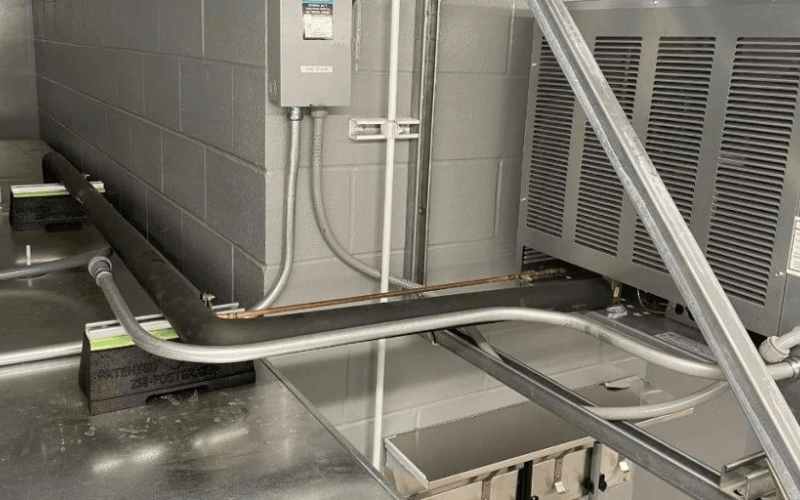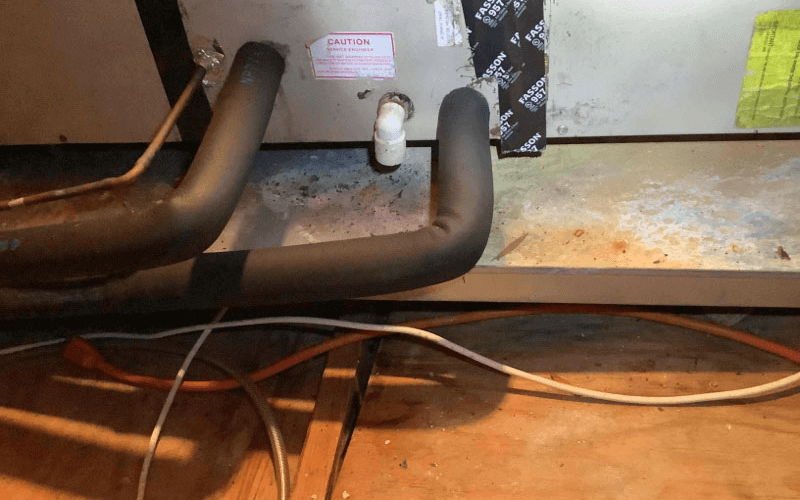Mitsubishi mini split systems are a popular and efficient way to cool and heat homes, offices, and other spaces. These systems are designed to provide zoned comfort, meaning each indoor unit can be controlled independently to adjust the temperature in different areas.
Table of Contents
ToggleMitsubishi mini splits offer other benefits, such as quiet operation, easy installation, and customizable design options. Plus, they use advanced technologies to ensure high efficiency and performance, which translates to lower energy bills and reduced environmental impact. In this article, we’ll delve deeper into the advantages and characteristics of Mitsubishi mini-split systems.
How Do Mitsubishi Mini Splits Work?
Mitsubishi mini split systems use advanced technologies to transfer heat between indoor and outdoor units. The indoor units blow cool or warm air into the room, while the outdoor unit removes heat or cold. Here are some subheadings to explain this process in more detail:
Heat Transfer:
Mitsubishi mini splits use a refrigerant to transfer heat between the indoor and outdoor units. The refrigerant absorbs the heat from the indoor unit and releases it to the outside unit, where it is discharged into the atmosphere.
Indoor Units:
The indoor units of Mitsubishi mini splits are typically mounted on walls or ceilings and blow cool or warm air into the room. Zoned comfort is possible because of the autonomous control of each indoor unit.
Outdoor Units:
The outdoor units of Mitsubishi mini splits contain a compressor, a condenser, and a fan. While the condenser unit eliminates heat from the refrigerant, the compressor transfers the refrigerant between the indoor and outdoor units. The heat is dispersed by the fan blowing air over the condenser.
Inverter Technology:
Mitsubishi mini splits employ inverter technology to change the compressor speed in response to the space’s requirements for cooling or heating. As a result, efficiency is increased, and temperature control is exact.
Remote Control:
When utilizing a Mitsubishi mini split, you may adjust the temperature, fan speed, and other settings from any location in the room using the remote control that comes with the unit.
Mitsubishi mini splits provide efficient, customizable, and easy-to-use heating and cooling solutions for homes and offices.
Mitsubishi Main Features
Mitsubishi mini split systems have various features that make them popular for heating and cooling. Here are some of the main features of Mitsubishi mini splits:
Zoned Comfort:
Mitsubishi mini splits allow you to control each indoor unit independently, which means you can adjust the temperature in different areas of your home or office based on your needs.
Energy Efficiency:
Mitsubishi mini splits use advanced technologies like inverter technology and high SEER ratings to provide efficient heating and cooling solutions that save money on energy bills.
Quiet Operation:
Thanks to the silent operation of Mitsubishi mini splits, you may enjoy a comfortable interior atmosphere without the noise associated with conventional HVAC systems.
Customizable Design:
Mitsubishi mini splits are available in various shapes, sizes, and hues, so you can pick one that complements your interior design and fits your room well.
Easy Installation:
Mitsubishi mini splits are easy to install and don’t require ductwork to avoid the time and expense associated with traditional HVAC installations.
Advanced Air Filtration:
Because Mitsubishi mini splits include cutting-edge air filtration systems that eliminate contaminants, allergens, and other airborne particles, your home will be cleaner and healthier.
Overall, Mitsubishi mini splits offer a range of features that make them a versatile and efficient heating and cooling solution for homes and offices.
Mitsubishi Mini Splits Disadvantages
Although Mitsubishi mini split systems have many benefits, there may also be drawbacks. Here are some of the main disadvantages of Mitsubishi mini splits:
Upfront Cost:
The initial cost of a Mitsubishi mini split system can be higher than traditional HVAC systems, which may be a barrier for some homeowners.
Professional Installation:
While Mitsubishi mini splits are easier to install than traditional HVAC systems, they still require professional installation, which can be an added expense.
Maintenance:
Like all HVAC systems, Mitsubishi mini splits require regular maintenance to ensure efficient and reliable performance. This may entail evaluating electrical components, checking refrigerant levels, and cleaning filters.
Limited Capacity:
There may be better options than Mitsubishi mini splits for larger homes or commercial spaces that require higher-capacity HVAC systems.
Climate Limitations:
While Mitsubishi mini splits can provide efficient heating and cooling in most climates, there may be better options in extreme weather conditions.
While Mitsubishi mini splits offer many advantages, there may be better options for some situations. It’s important to consider the potential disadvantages and consult a professional HVAC contractor to determine if a Mitsubishi mini split system is right for your home or office.
Are Mitsubishi Mini Split Energy And Cost Efficient?
The zonal comfort control also has an excellent energy economy. These systems use modern inverter technology, which enables exact adjustments to the compressor speed, enhancing the cooling or heating process. In contrast to standard HVAC systems, which operate on an on-off cycle, Mitsubishi Mini Split Systems maintain a steady temperature by adjusting the Compressor Speed based on the required settings.
The ability to control compressor speed reduces energy usage, making Mitsubishi Mini Split Systems more efficient and cost-effective in the long run. These systems can achieve more energy savings than conventional ones by working at the ideal speed required to maintain the set temperature, decreasing power expenditures.
Furthermore, the zoned comfort control feature allows users to cool or heat specific areas, preventing energy from being spent on empty or underutilized spaces. This zoning capacity contributes to Mitsubishi Mini Split Systems’ overall energy efficiency.
Is Mitsubishi Mini Split Worth Buying?
Whether a Mitsubishi mini split system is worth buying depends on your needs and circumstances. If you’re looking for an efficient, customizable, and easy-to-use heating and cooling solution for your home or office, a Mitsubishi mini-split system may be a great choice.
With zoned comfort, energy efficiency, quiet operation, customizable design, easy installation, and advanced air filtration, Mitsubishi mini splits offer a range of features that make them a versatile and reliable HVAC option. Potential downsides include the upfront cost, professional installation, maintenance requirements, limited capacity, and climate limitations. If you value these aspects, looking into alternative HVAC alternatives can be worthwhile.
The choice to purchase a Mitsubishi micro split system is ultimately based on a detailed assessment of your heating and cooling requirements, financial constraints, and top priorities. Consulting with a professional HVAC contractor can help you determine if a Mitsubishi mini split system is the best choice for your home or office and which model and configuration will provide the most efficient and effective performance.
Conclusion
Mitsubishi mini split systems offer a range of benefits that make them a popular and efficient choice for heating and cooling homes and offices. With zoned comfort, energy efficiency, quiet operation, customizable design, easy installation, and advanced air filtration, these systems provide reliable and versatile HVAC solutions that can save money on energy bills and improve indoor air quality.
While there are potential disadvantages, such as the upfront cost, professional installation, and maintenance requirements, the decision to invest in a Mitsubishi mini split system should be based on your specific needs and circumstances. Consulting with a professional HVAC contractor can help you determine if a Mitsubishi mini split system is the best choice for your home or office, and if so, which model and configuration will provide the most efficient and effective performance.
FAQs
Can Mitsubishi mini splits be used for heating and cooling?
Of course, because Mitsubishi mini splits can supply both temperatures and air conditioning, they are a flexible HVAC choice.
Can Mitsubishi mini splits be used in all climates?
While Mitsubishi mini splits can provide efficient heating and cooling in most climates, extreme weather conditions may require a different type of HVAC system.
Do Mitsubishi mini splits require maintenance?
Like all HVAC systems, Mitsubishi mini splits require regular maintenance to ensure efficient and reliable performance. This may entail evaluating electrical components, checking refrigerant levels, and cleaning filters.
What is the cost of a Mitsubishi mini-split system?
The cost of a Mitsubishi mini split system can vary depending on the size, configuration, and features of the system, as well as installation costs. Consult a certified HVAC contractor to receive an exact quotation.





















